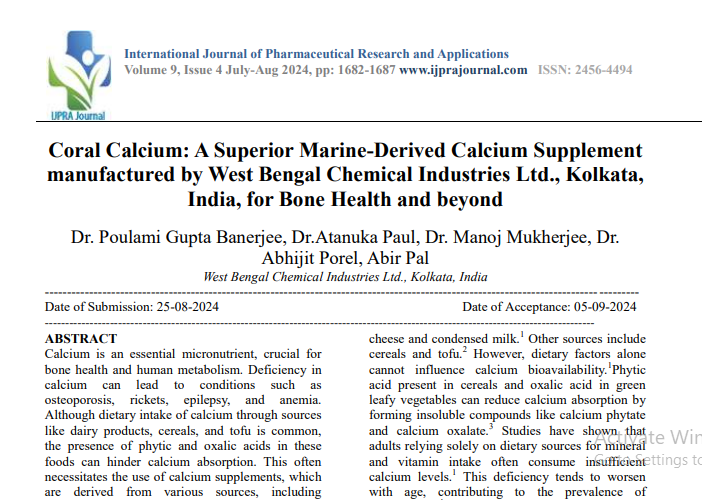Coral Calcium: A Superior Marine-Derived Calcium Supplement manufactured by West Bengal Chemical Industries Ltd., Kolkata, India, for Bone Health and beyond

Coral Calcium: A Superior Marine-Derived Calcium Supplement
Calcium is an essential micronutrient, crucial for bone health and human metabolism. Deficiency in calcium can lead to conditions such as osteoporosis, rickets, epilepsy, and anemia. Although dietary intake of calcium through sources like dairy products, cereals, and tofu is common, the presence of phytic and oxalic acids in these foods can hinder calcium absorption. This often necessitates the use of calcium supplements, which are derived from various sources, including calcium carbonate ores, animal skeletons, marine shells, and crustaceans. Among these, marinederived calcium supplements, particularly coral calcium, have gained popularity due to their high safety profile, biological activity, and natural composition, which closely resembles human bone. West Bengal Chemical Industries Ltd. (WBCIL), India, specializes in producing high-quality coral calcium supplements from naturally occurring coral sand deposits. These supplements, composed primarily of calcium carbonate alo...
Calcium is a crucial micronutrient, significantly impacting bone health and human metabolism.1 Calcium deficiency is associated with conditions such as osteoporosis, rickets, epilepsy, and anemia. Calcium is absorbed into the circulation through dietary intake or calcium supplements, maintaining a dynamic balance between blood and bone calcium levels.1 The primary dietary sources of calcium are dairy products, including milk and its derivatives such as cheese and condensed milk.1 Other sources include cereals and tofu.2 However, dietary factors alone cannot influence calcium bioavailability.1 Phytic acid present in cereals and oxalic acid in green leafy vegetables can reduce calcium absorption by forming insoluble compounds like calcium phytate and calcium oxalate.3 Studies have shown that adults relying solely on dietary sources for mineral and vitamin intake often consume insufficient calcium levels.1 This deficiency tends to worsen with age, contributing to the prevalence of osteoporosis.4Consequently, many individuals have turned to calcium supplements to meet their nutritional needs.1 Calcium supplements are derived from various sources, including calcium carbonate ores, calcium-rich animal skeletons, marine shells, and crustaceans.5 However, natural calcium carbonate ores may contain harmful elements such as heavy metals, and animal-derived calcium carries the risk of prion transmission.6,7 In recent years, marinederived calcium supplements have gained attention due to their abundant availability, high safety profile, and biological activity.8,9 Marine mineral supplements have shown potential in enhancing bone turnover, preventing injuries, and aiding in bone repair. Utilizing marine biological calcium represents a significant opportunity to improve the utilization of biological resources and address calcium deficiency effectively.1Coral calcium is derived from the exoskeletons of various marine organisms and serves as a natural source of marine calcium.1 It contains approximately 24% calcium, 12% magnesium, and over 70 trace minerals. Recently, coral calcium has gained international popularity as a calcium supplement. It is commonly used to manage bone metabolism disorders, osteoporosis, and other bone-related diseases.10,11,12,19 Beyond its role in enhancing calcium homeostasis and bone health, marine biological calcium exhibits additional biological functions.1 For instance, coral calcium has been shown to regulate blood pressure and inhibit the metastasis of colon cancer.1 Moreover, coral calcium hydroxide demonstrates antioxidant properties, which can decelerate the aging process in murine models and prevent hepatic steatosis.1However, direct consumption of coral calcium presents significant challenges due to the presence of pollutants, heavy metals, and biological contaminants in the raw material. Naturally occurring coral sand often contains harmful substances such as lead, mercury, and other heavy metals, which can pose serious health risks if ingested. Additionally, the raw coral material can harbor various biological contaminants, including bacteria and other microorganisms, that must be carefully removed to ensure the safety and purity of the final product. Therefore, a thorough purification process is essential to eliminate these hazards, making the coral calcium safe and suitable for human consumption.

Recently Visited
Position your company at the heart of the global Pharma industry with a CPHI Online membership
-
Your products and solutions visible to thousands of visitors within the largest Pharma marketplace
-
Generate high-quality, engaged leads for your business, all year round
-
Promote your business as the industry’s thought-leader by hosting your reports, brochures and videos within your profile
-
Your company’s profile boosted at all participating CPHI events
-
An easy-to-use platform with a detailed dashboard showing your leads and performance